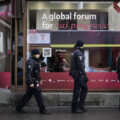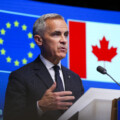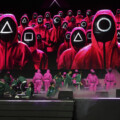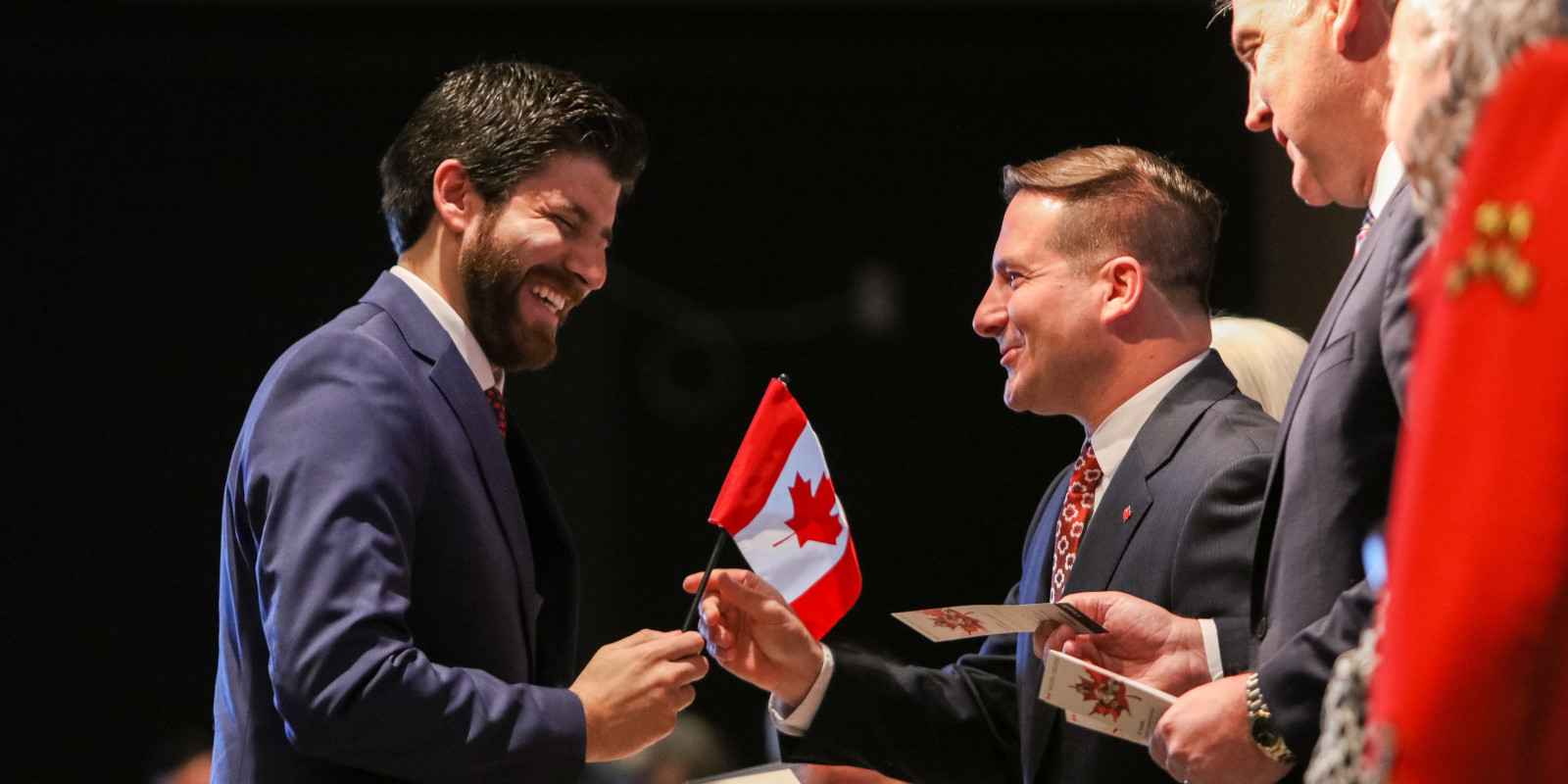This week marks the hundredth episode of The Hub’s podcast, Hub Dialogues. (This doesn’t account for more than sixty dialogues that we published last year as transcribed interviews including with George Will, Benjamin Friedman, John Ikenberry, Marie Henein, and Lisa Feldman Barrett.)
Of the 100 podcast episodes to date, 14 have been our exclusive bi-weekly interviews with David Frum and another 25 are the weekly Hub Roundtable with executive director Rudyard Griffiths, editor in chief Stuart Thomson and me. That leaves just over 60 episodes with a diverse group of economists, business executives, medical doctors, legal scholars, scientists, writers, and even some politicians.
It has been a great honour and joy to speak with such a fascinating group of thinkers and doers. If you would have told the 20-year-old me that I would eventually get paid to interview global opinion leaders — including some of my favourite thinkers and writers — I wouldn’t have believed you. What a privilege.
The great reward is that Hub Dialogues’ audience continues to significantly grow. Monthly downloads have increased 380 percent since we launched in mid-January. We’re enormously grateful to the Hub community for its interest, engagement, and feedback.
We’re excited for the next hundred episodes of Hub Dialogues with new and different guests, more diverse topics, better recording equipment, and hopefully slow yet steady improvement on the part of the host.
In the meantime, I thought that I’d go back through our catalogue and profile some of the most interesting ideas and insights that we’ve heard thus far. The list isn’t meant to be exhaustive — regular listeners will no doubt have others (which we would be thrilled to hear) — but instead reflects some of my most memorable moments from the first 100 episodes of Hub Dialogues.
“Of course, we romanticized the West. But nothing is ever set in stone. Now 20 years later, free speech has fallen down the list of values, and freedom of assembly has fallen down the list of values. Police having the monopoly on violence and policing itself is being questioned. One set of laws for all is also being questioned in Canada, philosophically, practically, and politically. All these things have been chipping away Canada’s liberal democracy and Canadians seems to be okay with it.” – Lydia Perovic, episode #94, August 4, 2022
“I think that, increasingly, the axis of politics in the West revolves around culture and not economics. It revolves around this divide between what I call “cultural socialism” on the one hand and cultural liberalism and conservatism on the other which believes in both the Enlightenment and national tradition. And because of that and because of the success of the Left in capturing elite institutions, there was almost an in-built extent to which conservatism has to campaign against existing institutions.” – Eric Kauffman, episode #91, July 27, 2022
“America has been a boogeyman in Canadian politics. Lately, and for as long as I’ve been following, it’s been one that the liberals use to smear the conservatives. I think the pendulum is now shifting the other way. I think that it is Trudeau and the Liberals and the CBC who are importing American social justice ideology, who are following Americans, apeing the Americans, and so that kind of anti-American politics, which I think has really powerful potential in Canada, I wonder if we’ll see it become a conservative angle of attack and a conservative advantage in Canadian politics.” – Elliot Kaufman, episode #87, July 18, 2022
“When the Charter was being drafted and designed in the early 1980s, that concept of substantive due process had already been popularized in the United States. For that reason, our framers did not use the term “due process” in Section 7. They used the term “principles of fundamental justice.” In my view and in the view of many others, the record is clear: The reason they used principles of fundamental justice is specifically because due process had been interpreted broadly that way.” – Asher Honickman, episode #83, July 11, 2022
“For me, when I arrived in Nova Scotia, no one knew who I was. No one knew how I looked like, the only thing they had was my name. Like they didn’t even give them a picture of me, although I look more handsome than Leonardo DiCaprio, but that was not the thing that they cared about. What they cared about is, I think, when I reflect about the way that they have done the sponsorship, they were always caring about me being a human being seeking safety and peace. They were caring a lot about changing my life.” – Tareq Hadhad, episode #77, June 30, 2022
“I’ve said this before, but the governments around the world asked young people to put a pause on their life, to make significant sacrifices for the betterment of elderly individuals and the betterment of the community. Look, we asked everybody to do this, but, in particular, it was a serious ask of young people because the virus represented a very low risk to young people. What’s the thanks that young people get? Well, after two years of this, they reemerge from lockdowns and they find that they’re now responsible for a significant amount of government debt—the government doubled the debt—and they can’t afford a house. So, I think they’re kind of frustrated. They did what we asked them to do, what the government asked them to do, and now they’re frustrated.” – Adam Chambers, episode #76, June 27, 2022
“If I was grading it, I guess by those standards, by those expectations that I just set out— a responsible stakeholder in the existing international order? Looks like a failure. Economic liberalization? In fact to the contrary, China has been moving towards increased statist, mercantilist economic policies. Politically, of course, it’s become even more repressive than it was before. Arguably China is more repressive today than at any time since the Cultural Revolution. I think by all of those standards, engagement was a failure.” – Aaron Friedberg, episode #73, June 20, 2022
“I don’t think China’s going to implode in the near future, but I think it will become increasingly shaky, increasingly unpredictable, and increasingly difficult for its citizens and for its neighbours in the world. Which brings me back to my original idea that we need a smart China policy and we need to up our China competence. It’s in our Canadian interest and it’s key to a successful Canadian foreign policy.” – David Mulroney, episode #60, May 25, 2022
“It may be the single biggest threat to the development of opportunity and talent, because children born into truly one-parent families have much worse opportunities economically, but also in terms of how they’re brought up. It’s correlated with them being treated not as well. I don’t have a magic wand to wave to make all those men worthy of having a nice family, but we could do much more than what we’re doing now. Now, it’s a mix of not quite a priority, and for many people, it’s a subject you’re not even really allowed to bring up. That’s terrible, I think.” – Tyler Cowen, episode #59, May 24, 2022
“I like to use the analogy of a basket, the Medicare basket of services. And right now we have this very narrow, very deep basket that covers 100 percent of hospital and physician care. And I would like us to have more of a European model, which is a much broader basket that covers everything from dental care to long-term care, and everything in between for those who need it, and that basket be a little shallower. So, some people will have to pay for private or most people would have to pay for private insurance or some out of pocket. But the key there is clarity. We’re never going to pay 100 percent of everything for everyone. So, let’s be clear on where we draw the lines.” – Andre Picard, episode #56, May 16, 2022
“But you’re right to note that joy has a kind of potent and ongoing presence in the book. At one point, I actually Ctrl-F’ed to see “How often am I using this word?” And “Is it too often and are they coming too close together on a page or in a paragraph?” But the truth is, it feels like the right word to me because I think of joy as the specific kind of happiness that is connected to this sense of the cosmic sweep of things I was just talking about. It’s not mundane, in the sense of not quite Earthly. It connects us to just this wild improbability of our existence and the wonder of it all. And to me, it truly is one of the most beautiful and meaningful feelings you can experience. So yes, I think this book is, to a significant extent, about joy, which is to say about the kind of endless mystery of being here, of existing.” – Kathryn Schulz, episode #53, May 11, 2022
“And I do think that it’s very easy to get bored, frankly, in a liberal society that simply offers peace and prosperity. People want to be able to struggle; they’ve got this side of their personality that seeks recognition and dignity and gets very indignant when people don’t recognize the same causes and gods and forces that they do. That’s what I think has pushed many people to reject liberalism.” – Francis Fukuyama, episode #52, May 9, 2022
“I’m very interested in the idea of a celebration of North American identity as the first kind of true middle-class civilization that has ever really existed; a civilization that really begins and ends with the middle class, and whose culture has always been defined by the humility—or not the humility, the humble nature of middle-class life and middle-class luxuries, and middle-class pleasures and middle-class lifestyles. So, when I make videos about things like the history of potato chips, or the history of Christmas presents, or you know, history of Halloween, or soft things like this, it’s easy for people, I think, to be judgmental and to argue that these subjects are kind of frivolous or even materialistic. But to me, a lot of that kind of bourgeois, middle-classness is the culmination of the North American project, and something that I think really deserves celebration on its own terms.” – J.J. McCullough, episode #49, May 2, 2022
“I think it’s a problem with our political discourse that we have to listen to so much, if you permit again a rather polemical formulation, so much kitschy communitarianism, which pretends that if only we could all come together, if only we found a nice form of patriotism, then, you know, all would be well. Democracy isn’t about consensus. Democracy is about conflict; conflict is legitimate. It needs to be contained. It needs to be compatible with basic democratic principles such as freedom and equality.” – Jan-Werner Müller, episode #46, April 27, 2022
“So, what does it mean to be an American conservative? I think it means a defence of the particular American institutions and those institutions we traced to the founding of the United States: the Declaration of Independence; the Constitution; the political thought of the Constitution, which is expressed in the Federalist Papers. The political tradition that emanates from those documents and the system they established. That’s what I think American conservatives ought to defend. And that means that American conservatism is going to be more small “l” liberal, have a larger place for freedom in it because of the nature of that tradition.” – Matthew Continetti, episode #38, April 12, 2022
“So when you asked, Sean, if I’m optimistic about reconciliation, I say Indigenous Nations are ready to drive off the Indian Act superhighway. I believe that there are real leaders that have yet to secure a seat at the big political table in Ottawa who have the moral fortitude to sit with First Nations leadership and pave a new way forward. I think there are real leaders who understand that reconciliation is a tangible goal and not a romantic notion. I think that there are real leaders who understand that policies that promote empowerment, self and local government, and equality of opportunity will give way to greatness. And with that, my answer is I think the best is yet to come.” – Karen Restoule, episode #36, April 6, 2022
“A liberal democracy must be absolutely clear, even ruthless, about the question of violence. If we’re going to have pluralism, we have to obey. We have disagreeing, we can shout at each other, but you raise a hand against a fellow citizen in a political argument, and that’s the end of it, right? We’ve got to be very tough. Liberalism is not a warm bath, and liberal democracy is not a kind of sauna in which we all sit together. It’s an argument, and our job is, if we are in politics or in media or anywhere, is to keep it civil.” – Michael Ignatieff, episode #29, March 23, 2022
“I said this on CBC the other day: Canada has a nobler record in the world wars than America does, speaking as the grandson of a veteran and the great-grandson of war veterans in the Second World War and so forth. Canada was in the full time both times, so that’s its heroic and storied legacy on that front, But in the last couple of decades, Canada’s not been doing so much and it’s needed. It’s better if Canada does more on the defence side.” – Elbridge Colby, episode #17, February 28, 2022
“There’s this quote from an English missionary named Leslie Newbigin, he says: “I’m neither optimistic nor pessimistic, Jesus Christ is risen from the dead.” And that’s true for me. The Christian is supposed to act with charity, no matter the circumstances. So, I’m not positive, not negative, I guess. I’m committed to a particular way of life and a particular way of being charitable and loving, regardless of whether people are my enemies or my friends.” – Brian Dijkema, episode #12, February 16, 2022
“Unfortunately, it is controversial to be a normal dude in these abnormal circumstances. So outside of elite opinion, outside of universities and Twitter activists and all that space—where I’ll be honest, I do enjoy getting into a little bit of a back and forth with those sorts of people—but outside of all of that, when I’m like at my church, when I’m in my community, when I’m visiting my family, my friends, I’m not controversial; I’m a normal guy. And to me, when we talk about challenging the way power works in our country, where a very small number of people who are hostile to conservative values have a ton of power over our economy, over our political system, when we talk about challenging those folks, it’s not about being hard right to balance them out with some extreme position on the other side. It’s just about fighting to exist as a normal dude. If I can do that, then I think that that to me is the plan here, that normal people get to exist in abnormal situations and we’re not changed but those situations get changed. That would be the ideal way that I think we would exist.” – Jamil Jivani, episode #11, February 14, 2022
“Well, as I look at national security threats that confront the United States, I think the biggest threat to the United States is the United States. Our polarization is the single greatest threat to our future prosperity, security, liberty, and if you look at public opinion polling, you’ll see a shocking percentage of Americans believe that the 2020 election was stolen by President Joe Biden, which is absolutely not true. And so, this rampant misinformation, disinformation, polarization in our society is a foundational threat, I think, to this country. So, I’m really worried about it.” – Amy Zegart, episode #7, February 1, 2022
“What happened with digital media is that we no longer measure success in terms of breadth of the reach. The way we measure success is by a unit called engagement, meaning how many people retweeted your article? How many people commented on it? How many people posted it on Facebook? How many people angrily shared it with a scathing commentary? And of course, the secret of digital media is that the most extreme readers and viewers are always going to be the most engaged, meaning that you had all of these outlets starting to cater to their most extreme readership.” – Bayta Ungar-Sargon, episode #5, January 25, 2022
“Which raises, I guess, a final point in this, which is, I think conservative intellectual muscles atrophied in the 1990s, partly because they won a lot of fights, and they got lazy. And partly, they won a lot of those fights with the sledgehammer of the deficits. “We can’t do X or Y because we can’t afford it” became a very simple, one-size-fits-all answer to a lot of different questions. And it might have won the argument in the short-term, but at the cost of people going away grumbling, saying, “Well, is it the only reason we can’t afford it. What about when we can afford it? Well, what should we do with them?” So, rather than making arguments on the merits of what is the appropriate role of the state, what should it be doing, and what shouldn’t it be doing, it just became this kind of exercise in accountancy.” – Andrew Coyne, episode #1, January 18, 2022
Recommended for You

Falice Chin: The ‘wild and weird’ Calgary Stampede

‘A celebration of the spirit of Alberta’: Ryan Hastman on the political, economic, and cultural importance of the Calgary Stampede

‘Do more with less’: John Stackhouse, Janice Gross Stein, and Jaxson Khan on how Canada can catch-up in the AI adoption race

‘He’s a master of globalization in a re-nationalizing world’: Michael Ignatieff on the domestic and geopolitical challenges facing Prime Minister Carney




